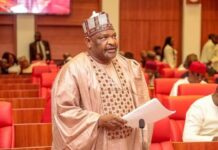The deputy whip at the House of Representatives, Nkiruka Onyejiocha, has said she is willing to accept any legislation to help curb what doctors have called the “rising trend of suicides” in Nigeria.
It comes as the Nigerian Medical Association in the FCT convened a scientific conference of experts to discuss the rising trend and fashion a way to curb it to be presented to “relevant authorities”.
“We all have members representing us in the House, we have governors and senators,” Onyejiocha told the conference.
“If you find anything we should do in terms of motions and bills, bring it to us. I am ready to take any motion, any bill on behalf of any Nigerian.”
Media monitoring by Daily Trust shows 42 Nigerians have killed themselves in the first six months of this year alone—11 of them students.
Last year, Daily Trust reported 80 Nigerians killed themselves in 13 months.
Police crime statistics going back to 2016 Ogun, Lagos and Ebonyi were among seven states with the highest number of suicides.
“Anybody who tries to commit suicide is a coward. What it simply means is that the person has failed in the school of life…There is nothing worth dying for.”
Females were more likely to attempt suicide, and males were three times more likely to successfully kill themselves.
Onyejiocha linked the higher male-female ratio of suicides to pressures that stem from neglect of women.
“The government the government is treating us is bad,” she said, citing how female representation in the assembly has fallen to 4%.
“Neglect of women folk is part of the reason some men kill themselves. I have no empirical evidence to back it up, but I think so,” she said.
At least 15 out of every 100,000 Nigerians kill themselves each year, according to report by the World Health Organisation.
But NMA has expressed worry about the trend rising among young people, with suicide being the second leading cause of death among 15-29-year-olds.
Studies have found suicide rates to rise from 0.6 in 100,000 people aged 14 and younger. For rate rises to nearly seven in 100,000 for people aged 15 to 19.
“There are a lot of factors that may be peculiar to young people,” said Dr Tayo Daramola, a consultant specialist and head of behavioural medicine at Karu General Hospital, guest lecturer at the suicide-themed conference.
“They are experimental, there could be personality issues, issues of depression, substance use disorders are common among young people.”
Dr Joseph Eziechila, a vice president of the NMA in the FCT, described it as “troubling” for countries like Nigeria with a relatively youthful population “where they make up a sizeable number and are the major productive age group.”
“To lose them to suicide has grave consequences for economic growth,” he added.
























